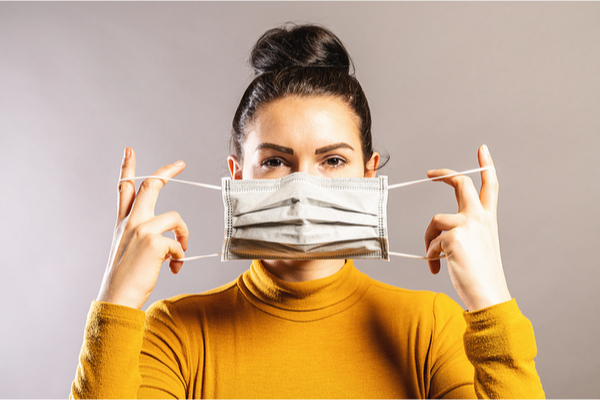Masking has been a contentious topic in the U.S. ever since public health officials first recommended their use to prevent the spread of COVID-19 back in 2020. Mask mandates greatly increased the use of wearing masks during the height of the pandemic, but as the mandates went away, some people kept masking and others didn’t.
Now, according to a new Yahoo News/YouGov poll, the majority of Americans aren’t regularly masking anymore — and some openly say they judge others who do. The poll found that most Americans — 73% — say they don’t judge people who wear masks in public. But 14% of those surveyed said that they “think less” of people who wear a mask in public.
The survey was conducted by YouGov using a nationally representative sample of 1,665 U.S. adults interviewed online from Aug. 17 to Aug. 21, 2023. According to the results, only 12% of Americans say they wore a mask outside their home always or most of the time over the past seven days. That’s down from 27% in January 2023 and 60% in January 2022.
So what has influenced changing attitudes toward wearing a mask? Experts explain.
Immunity has increased in the general population
At this point, the majority of the U.S. population has some level of immunity to COVID-19, whether from vaccination or previous infection, Dr. William Schaffner, an infectious disease specialist and professor at the Vanderbilt University School of Medicine, tells Yahoo Life. “Many people aren’t as worried about COVID anymore,” he says. The virus has also morphed over time to cause more of a cold-like illness than it did in the beginning of the pandemic, when pneumonia was a common complication, Schaffner says.
Not everyone needs to mask up
Currently the Centers for Disease Control and Prevention (CDC) says online that “masks can help protect you and others from COVID-19” but doesn’t have universal recommendations for masking for the general public. Doctors say most people don’t need to wear masks regularly at this point.
While COVID-19 cases, hospitalizations and deaths are ticking up with the rise of the Eris (EG.5) variant, they’re still much lower than they were in the past. “There are a whole lot of people out there who listen to trusted sources. When the advice is to wear a mask, they’ll wear a mask,” Murphy says. “But there are also a whole lot of people who won’t do that. It’s wise to be strategic about when to wear a mask.”
Mask fatigue is real
We’re about four years into the pandemic, and people are well aware of that, O’Donnell says. “Mask fatigue is real,” she says. Schaffner agrees. “Some people thought masks were a bother,” he says. “If they don’t have to use them, they won’t, and many people have decided they’re no longer necessary.”
As for judgment surrounding mask usage, O’Donnell points out that “masking became politicized, and there have been consequences to masking requirements.” As a result, some people have deeper associations with masks that go beyond protection against a highly contagious virus.
CDC still recommends masking if you’re high risk
The CDC still recommends that people who are at high risk of complications of COVID-19 consider wearing a well-fitting mask indoors when COVID-19 hospital admission levels are medium or high in their area. People who are considered high risk include those have a compromised immune system, people who are pregnant or have diabetes and those who have cancer and chronic lung disease.
O’Donnell points out that people wear masks because they’re immunocompromised or they care for a child, parent or partner who is. “They wear masks because they don’t want their elderly family member to be at risk when they visit their nursing home,” she says. “People wear masks because they were just exposed or recently infected and want to make sure they don’t spread it to others.”
Be kind to those who mask – there’s probably a good reason
As far as people judging others for wearing masks, O’Donnell says: “I am saddened to see that 14% of survey respondents said they ‘think less’ of people wearing masks in public. I would remind people that none of us know the individual stories and health concerns of the people we meet and pass in our daily lives on the streets, in stores and restaurants and at social gatherings. We should accept each person’s decision to wear a mask and not pass judgment.”
Murphy says it’s “wise” to wear a mask indoors if you’re at high risk for COVID-19 complications or if you plan to spend time indoors with someone who is high risk, such as an elderly grandparent. “It’s smart to be strategic about it,” he adds.
Schaffner stresses the importance of supporting those who choose to wear a mask — and considering it for ourselves when the need arises. “Using masks can add to protection from COVID-19,” he says. “We ought to respect people who wear masks. Once cases of flu and COVID-19 increase in communities, you will start seeing more of them again.”
—
Photo Credit: r.classen / Shutterstock.com
